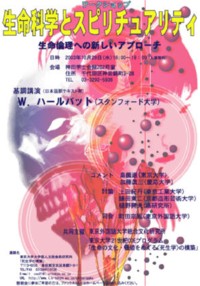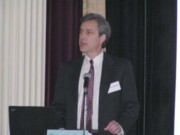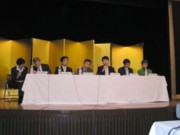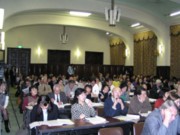
 |
|
Workshop :
|
|
October 29, 2003 16:00-19:00 at Gakushi-Kaikan, Tokyo
|
 |
First in order was a keynote speech by Prof. William Hurlbut addressing the reason to be cautious in utilizing human embryos for research purposes, an issue that has been central and pivotal in bioethics in recent years.
Prof. Hurlbut is a specialist in human biology with a background in theology and also a father of a disabled child. Presently, the United Kingdom allows for a cloned embryo from a rather early stage of its development to be used for research purposes, using a 14-day rule as a guideline. However, contestations against the 14-day rule are strong and deep-rooted in other parts of the world, as the primitive outlines of a human body begin to form around this period, and thus the use of embryos at this stage renders an incorporation and utilization of a human existence for research purposes. The President's Council on Bioethics in the United States decided on a four-year moratorium on this issue and proposed to deepen the discussion.
Prof. Hurlbut pointed out the arbitrariness of the distinction implied by the 14-day rule that contends that before the 14-day period an embryo is not a human, and argued that human life is a continual process from the inception of life. He further argued that respecting the continuity of life and taking a cautious approach to the research use of embryos is in accord with the position that respects the rigorousness of science and is rooted in the understanding of spirituality that dignifies human life.
Responding to Prof. Hurlbut, scholars from Japan specializing in religious studies, anthropology and medicine (Shinzo Kato , Susumu Shimazono , Noriyuki Ueda , Touji Kamata , Okio Hino ) voiced their opinions from varying perspectives on the relationship between spirituality and the issues presented. Different religions and different cultures approach death and life differently, and subscription to a specific religion affects the decision making process. The discussion focused on the question of whether it is possible to share an ethical standard among the human race, and if the concept of "spirituality" could play the role of a common guideline. Furthermore, panelists discussed what alternative ways are possible to establish agreement within varying religions and cultures if "spirituality" fails to establish a common ground. The lively participation from the audience contributed to the dynamic interactions among the scholars and the audience.
I should add that this workshop was co-hosted by The Institute of Transcultural Studies at Tokyo University of Foreign Studies, and that many members from the "Workshop on inochi (life)" hosted by Prof. Soho Machida of the University of the Tokyo of Foreign Studies were among the participants.
(Susumu Shimazono )
 |
 |
 |